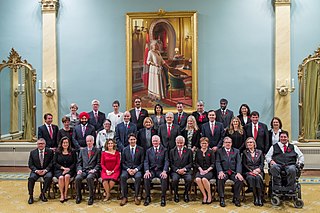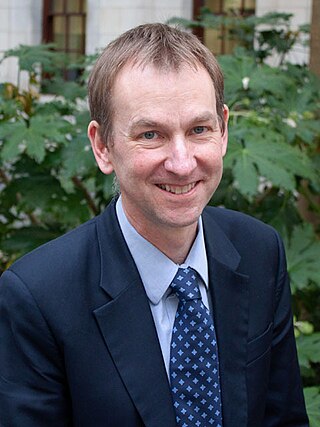Notes
| Ministers | |
|---|---|
| Civil Service | |
| Ministerial departments | |
| Non-ministerial department | |
| Executive agencies | |
| Non-departmental public bodies |
|
| Other organisations | |
| Secretariats | |
The Senior Salaries Review Body, established 1971 provides advice to the Prime Minister, Lord Chancellor and Secretary of State for Defence relating to remuneration of holders of public office.
Additionally it advises the Prime Minister on pay and pensions of Members of Parliament.
The current Chair is Lea Paterson, who was appointed on 17 October 2024. [1]

The prime minister of Australia is the head of government of the Commonwealth of Australia. The prime minister is the chair of the Cabinet of Australia and thus the head of the federal executive government. Under the principles of responsible government, the prime minister is both responsible to and a member of the Commonwealth Parliament. The current prime minister is Anthony Albanese of the Australian Labor Party, who assumed the office on 23 May 2022.

The prime minister of New Zealand is the head of government of New Zealand. The incumbent prime minister, Christopher Luxon, leader of the New Zealand National Party, took office on 27 November 2023.

The deputy prime minister of the United Kingdom is an honorific title given to a minister of the Crown and a member of the British Cabinet, normally to signify a very senior minister, the deputy party leader, or a key political ally of the prime minister. It does not entail any specific legal responsibilities, though the holder may be assigned some, and is usually paired with a departmental secretary of state position. The title is not always in use and prime ministers have been known to appoint informal deputies without the title of deputy prime minister. The current deputy prime minister is Angela Rayner.

The prime ministerof Sweden is the head of government of the Kingdom of Sweden. The prime minister and their cabinet exercise executive authority in the Kingdom of Sweden and are subject to the Parliament of Sweden. The prime minister is nominated by the speaker of the Riksdag and is elected by the chamber by simple majority, using negative parliamentarianism. The Riksdag holds elections every four years, in the even year between leap years.

The Chancellor of the Duchy of Lancaster is a ministerial office in the Government of the United Kingdom. Excluding the prime minister, the chancellor is the highest ranking minister in the Cabinet Office, immediately after the prime minister, and senior to the Minister for the Cabinet Office. The role includes as part of its duties the administration of the estates and rents of the Duchy of Lancaster.

The Cabinet of Canada is a body of ministers of the Crown that, along with the Canadian monarch, and within the tenets of the Westminster system, forms the government of Canada. Chaired by the prime minister, the Cabinet is a committee of the King's Privy Council for Canada and the senior echelon of the Ministry, the membership of the Cabinet and Ministry often being co-terminal; as of November 2015 there were no members of the latter who were not also members of the former.

The first minister of Scotland, formally known as the First Minister and Keeper of the Scottish Seal, is the head of government of Scotland and the leader of the Scottish Government, the executive branch of the devolved government of Scotland. The first minister also serves as the keeper of the Great Seal of Scotland whilst in office.

The prime minister of Singapore is the head of government of Singapore. The president appoints the prime minister on the advice and consent of the Cabinet of Singapore. The incumbent prime minister is Lawrence Wong, who took office on 15 May 2024.
A cabinet secretary is usually a senior official who provides services and advice to a cabinet of ministers as part of the Cabinet Office. In many countries, the position can have considerably wider functions and powers, including general responsibility for the entire civil service.

The Cabinet of Australia, also known as the Federal Cabinet, is the chief decision-making body of the Australian government. The Cabinet is selected by the prime minister and is composed of senior government ministers who administer the executive departments and ministries of the federal government.

First Secretary of State is an office that is sometimes held by a minister of the Crown in the Government of the United Kingdom. The office indicates seniority, including over all other secretaries of state. The office is not always in use, so there have sometimes been extended gaps between successive holders.

The president of Mongolia is the executive head of state of Mongolia. The current president is Ukhnaagiin Khürelsükh.

The Singapore Civil Service is the bureaucracy of civil servants that supports the Government of Singapore. Along with the Singapore Armed Forces (SAF), statutory boards, and other independent government bodies, the civil service makes up the overall public service of Singapore. As of 2022, the civil service has about 87,000 employees.

The Cabinet of Singapore forms the executive branch of the Government of Singapore together with the president. It is led by the prime minister who is the head of government. The prime minister is a Member of Parliament (MP) appointed by the president who in the president's judgment is likely to command the confidence of the majority of the Members of Parliament (MPs). The other ministers in the Cabinet are Members of Parliament appointed by the president acting in accordance with the advice of the prime minister. Ministers are prohibited from holding any office of profit and from actively engaging in any commercial enterprise.

The Chief Election Commissioner of India (CEC) heads the Election Commission of India, a body constitutionally empowered to conduct free and fair elections. An election commissioner is appointed by the President of India on the recommendation of a three member selection committee headed by the Prime Minister of India and senior most election commissioner is appointed as chief election commissioner. The term of a CEC can be a maximum of six years or till he/she attains sixty five years of age. The Chief Election Commissioner is usually a member of the Indian Civil Service and mostly from the Indian Administrative Service.

The Federal Executive Council (FEC), also simply known as The Cabinet is the cabinet of ministers of the Federal Republic of Nigeria and is part of the executive branch of the Government of Nigeria. The council's role, as written in the Ministers' Statutory Powers and Duties Act, is to serve as an advisory body to the President of Nigeria, who serves as the FEC's chairman. Members of the cabinet are appointed by and report to the President, who can dismiss them at will. The cabinet currently consists of 24 Federal Ministries, each responsible for some aspect of providing government services, as well as a number of parastatals (government-owned corporations).

In Sri Lanka, the Cabinet of Ministers is the council of senior ministers responsible and answerable to the Parliament of Sri Lanka. The President is a member of the cabinet and its head.

Sir Thomas Whinfield Scholar is a British civil servant who served as Permanent Secretary to the Treasury from 2016 to 2022. He was previously the prime minister's adviser on European and global issues in the Cabinet Office from 2013 to 2016. He has been a director of the nationalised bank Northern Rock, and served as chief of staff for Gordon Brown.
The basic annual salary of a Member of Parliament (MP) in the House of Commons is £91,346, plus expenses, from April 2024. In addition, MPs are able to claim allowances to cover the costs of running an office and employing staff, and maintaining a constituency residence or a residence in London. Additional salary is paid for appointments or additional duties, such as ministerial appointments, being a whip, chairing a select committee or chairing a Public Bill committee.

Sir Martin Peter Read, is a British businessman who has been Chairman of the Senior Salaries Review Body since January 2015, and Chairman of Wincanton plc since 2018.